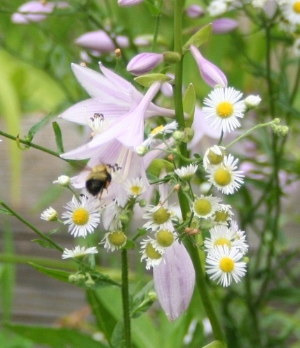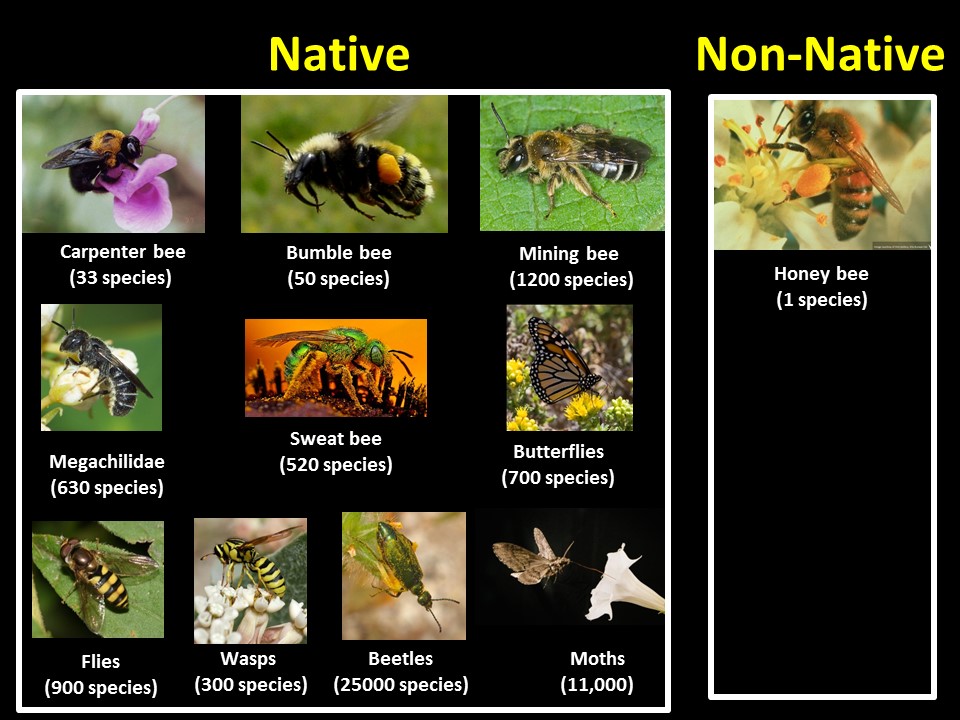Native pollinators are vital to creating and maintaining the habitats and ecosystems that most animals rely on for food and shelter — including humans. What happens (or doesn’t happen) at the pollination scale has repercussions all the way up the food chain. Over 80% of the flowering plants on Earth depend upon insect-mediated pollination; bees alone pollinate 45% of the food crops grown in Massachusetts, and one-third of them food grown in the United States.
 In a study that was published in June 2020, researchers determined that habitat loss from expanding agriculture and development as well as climate change were the primary drivers for a 94% loss of plant-pollinator networks across northern New England over the past 125 years. Multiple wild bee species presently in decline were found to have historic ties to plant species which are presently threatened or endangered. Because many of these plant species are no longer found in most of their historic range, the scientists concluded that conservation efforts specifically on habitat restoration for declining wild bee and plant species are fundamental to the preservation of regional biodiversity. In many cases plant-pollinator relationships have been disrupted directly as a result of invasive plants replacing natives in their historic range.
In a study that was published in June 2020, researchers determined that habitat loss from expanding agriculture and development as well as climate change were the primary drivers for a 94% loss of plant-pollinator networks across northern New England over the past 125 years. Multiple wild bee species presently in decline were found to have historic ties to plant species which are presently threatened or endangered. Because many of these plant species are no longer found in most of their historic range, the scientists concluded that conservation efforts specifically on habitat restoration for declining wild bee and plant species are fundamental to the preservation of regional biodiversity. In many cases plant-pollinator relationships have been disrupted directly as a result of invasive plants replacing natives in their historic range. Pollinator declines are occurring in two distinct but equally important contexts worldwide. In an agricultural context, there has been a considerable amount of attention on the loss of managed honeybees, a single non-native species. Far less attention has been focused on the decline of native pollinators such as bumblebees and monarch butterflies in an ecological context. The decline of managed bees has important social and economic consequences due to the role that they play in crop pollination. No bees equals no food and less money in the agroeconomy. Conservation efforts have focused on maintaining abundance of managed and wild bees that are good pollinators of particular crop plants. Unfortunately, the vast majority of our native bees and other pollinators are not important in this context and therefore get overlooked in conservation efforts.
Pollinator declines are occurring in two distinct but equally important contexts worldwide. In an agricultural context, there has been a considerable amount of attention on the loss of managed honeybees, a single non-native species. Far less attention has been focused on the decline of native pollinators such as bumblebees and monarch butterflies in an ecological context. The decline of managed bees has important social and economic consequences due to the role that they play in crop pollination. No bees equals no food and less money in the agroeconomy. Conservation efforts have focused on maintaining abundance of managed and wild bees that are good pollinators of particular crop plants. Unfortunately, the vast majority of our native bees and other pollinators are not important in this context and therefore get overlooked in conservation efforts.[Sources: Evan Abramson, Dr Rober Gegear]
